This article is a reflection on a recent decision affecting newborn screening policy in the United States. Let me be clear—newborn screening is a human right.
NEWBORN SCREENING IS A HUMAN RIGHT
On April 3, 2025 the Advisory Committee on Heritable Disorders in Newborns and Children was terminated immediately and without warning. A letter was sent to committee members and began circulating online. I saw the news on Thursday like others in our community and was devastated. It took me some time to gather and share my thoughts.
First, let me just say that I’m sharing my thoughts as a member of the community. I have never been on this committee and have no direct knowledge of its workings. I know people who have served on it, and that is the extent of my direct knowledge. So I cannot answer any questions about this issue without pointing to what others have shared.
I recommend you read this statement from the National Organization for Rare Disorders (NORD).
But this committee’s work on behalf of the rare disease community was invaluable. And its termination is a step backwards for newborn screening policy in the United States.
MY INITIAL THOUGHTS
I’ll be transparent. When I first heard the news, I was extremely angry. It took me some time to calm down. I followed my daily practice of reading wisdom literature, meditating, and journaling. It helped me find clarity so I could express my thoughts and feelings.
Once I gathered my thoughts I shared this across social media.
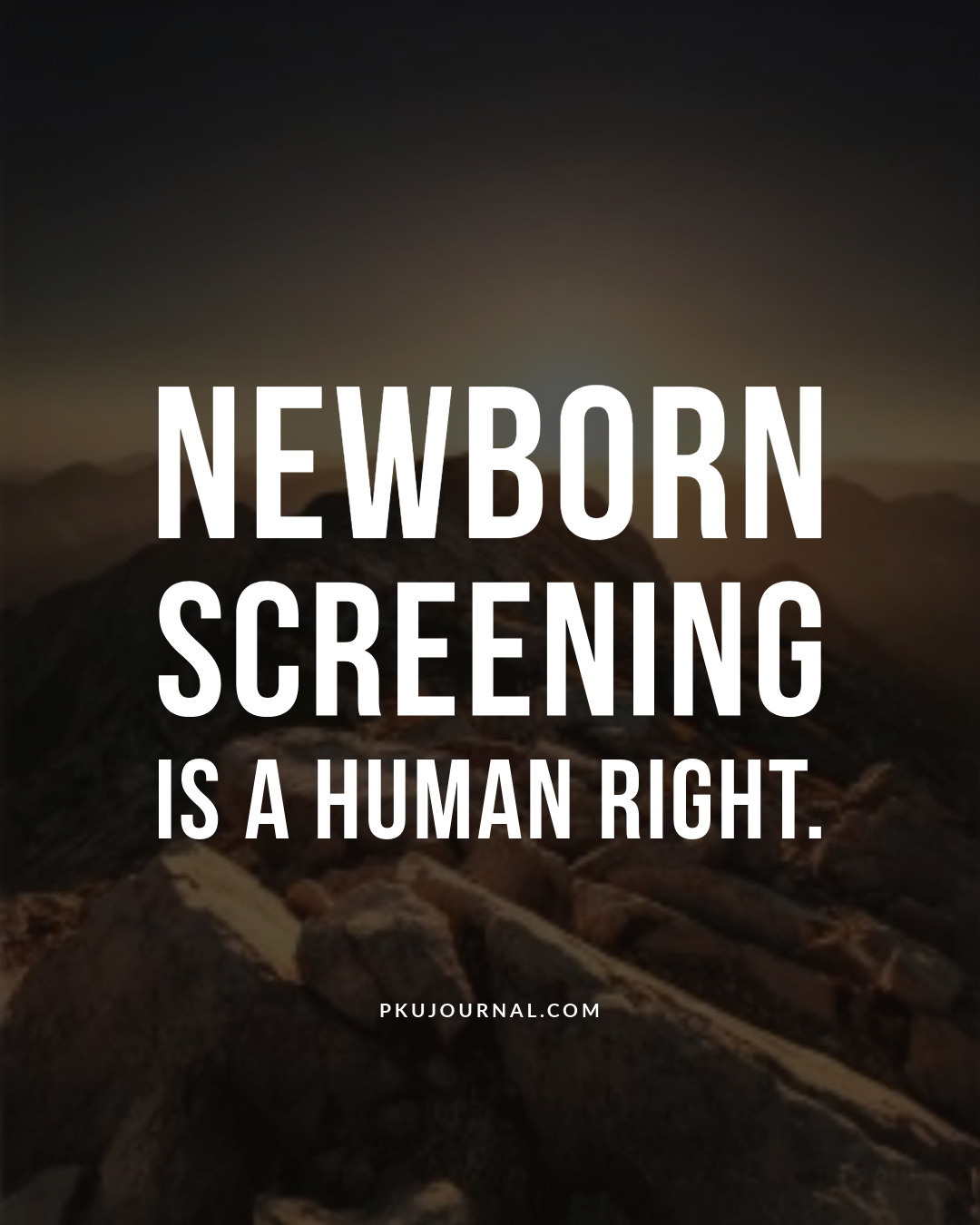
“As someone whose life was changed by newborn screening, I cannot adequately state how disheartened I am to hear of the decision to terminate the Advisory Committee on Heritable Disorders in Newborns and Children. This committee made recommendations to the Secretary of Health & Human Services regarding newborn screening policy.
Their single greatest achievement, in my view, is the creation of the Recommended Uniform Screening Panel (RUSP) which sets standards about what to screen for and which states consider in their programs.
Any system has flaws. But can anyone truly calculate the impact of this program?
What value can you place on my ability to write these sentences? To devote my life to PKU and newborn screening advocacy? To use my professional skills to benefit my rare disease community?
Because I owe my LIFE—everything that my life was, is, and shall be—to newborn screening.
I produced this film in 2013 about the value of newborn screening. And I think it’s never been more timely.
I hope one day it’s no longer necessary to share it. But until that day, it seems like I need to start sharing it again.”
A DEEPER DIVE – THE POLICY EXPERTS
Now, let me get this out of the way first. Others in our community are much more informed about the intricacies of newborn screening policy, the value of the Advisory Committee on Heritable Disorders in Newborns and Children (ACHDNC), and the process behind guiding the addition of rare diseases to the Recommended Uniform Screening Panel (RUSP). I’m not going to get into any of that.
Here are some organizations for you to research and connect with who deal with these issues on a regular basis, beginning with the ones directly related to PKU and branching out to the larger rare disease community. Some of these might serve the global community, but they are all based in the US and familiar with US policy:
- The National PKU Alliance
- flok
- Association of Public Health Laboratories
- Baby’s First Test
- EveryLife Foundation for Rare Diseases
- The National Organization for Rare Disorders
MY PERSPECTIVE OF NEWBORN SCREENING
Why does any of this matter to me?
Most importantly, I live with Phenylketonuria (PKU). The history of newborn screening and PKU is inextricably linked. I’ve told some of those stories before here on this website and on my podcast. Most relevant to this discussion is this one about Dr Robert Guthrie, inventor of the bloodspot test for newborn screening. That story includes a description of what is called “the newborn screening system”, provided by my friends at the Association of Public Health Laboratories, which is crucial to understanding this discussion. Newborn screening isn’t an event. It’s a system of interrelated and interconnected moving parts.
I’m a direct beneficiary of Dr. Guthrie’s work. As are countless people across the world who have been saved through newborn screening.
I’m also a storyteller. Professionally.
I told my story of living with PKU in a film called “My PKU Life”. Then I produced “For Katy”—the film I referenced earlier in this article—which shows the concrete, tangible results of a delayed diagnosis. I’ve been on an advocacy journey since 2012, traveling the world to share my story and produce other media about PKU and newborn screening. And I hosted “Never Give Up: A Rare Disease Podcast” in which I shared stories from my life, my community, and our shared history to inspire others in their journeys.
I’ve shared all of this countless times over the years.
But there’s one perspective that I’ve only mentioned a few times, here and there. And there is no way I can honestly discuss this issue without sharing more about it.
MY GUIDING PRACTICE
I made references to this in “My PKU Life”, but I am a person of faith. I don’t talk about that much. My travels have sent me around the world and introduced me to people from every background, every belief, every socio-economic status. That exposure to diversity is precious to me.
We’re all on a journey.
And the way I express my journey is simple: I have a spiritual practice that compels me to love everyone.
Because every human life is precious.
I shared some of my life experiences in a story called “Regaining Hope: My Journey to Rare Disease Advocacy”. While working in the news, I covered the aftermath of Hurricane Katrina. I covered countless car accidents and violent crimes. And I experienced personal traumas.
I saw things, heard things, and smelled things that no human should ever see, hear, or smell.
Those experiences taught me an invaluable life lesson…
People are all that matter. Period.
I try to make sense of senseless experiences the best way I know how—through my spiritual practice and lifelong study. I read classic literature. History. Philosophy. Biography. Theology. And so, I earned a Master of Arts Degree in Theological Studies. That was before my advocacy journey began, and it’s something I’ve carried with me all these years.
My spiritual practice compels me to love everyone. Period.
Because every human life matters.
All life is precious.
ALL LIFE IS PRECIOUS
I keep my views to myself. Everyone’s perspective matters.
Every story matters.
Every person matters.
Every voice matters.
I come from a different generation of broadcasting. We understood that the journalist’s job was to keep private opinions to themselves, as much as possible. I try to do that.
But I also try to speak from my experience to encourage others to share their experiences.
I might not share my spiritual views openly (a decision itself that some might disagree with), but my spiritual practice informs every aspect of my advocacy.
Sharing my story to inspire others…
Helping others find their voice…
Helping others find their courage…
Helping others find hope.
I don’t wear my spirituality on my sleeve. I wear it in my heart.
And allow it to inform every thought, every action, every word. Or, at least… I try to do those things.
To love people. Be kind to them.
Be gentle when I need to.
Fierce when I need to.
And at all times—at all times—be empathetic.
Because all life is precious.
A DECISION DEVOID OF EMPATHY
So, let’s get back to this recent decision.
Our society in the United States has a serious problem. And that’s a lack of empathy.
We can’t stand each other.
We hate each other.
We have our views and we can’t see things from another person’s point of view.
I say “we” for a reason. I’m guilty of this.
I find myself getting angry over the state of things, and I let that anger fester, and I lash out. Most of the time, I lash out into my daily journal. Again, I keep my views to myself. I don’t want my personal views to get in the way of my message about PKU, newborn screening, and rare disease advocacy.
But there are times when you just have to lay it all on the line and say what you believe. No matter the consequences.
And that post I shared to social media, the one at the top of this article…
It’s a non-partisan view about destructive policy.
This decision is a giant step backward for newborn screening policy in the United States. It’s a decision that, in my view, wasn’t thought out, wasn’t executed well, wasn’t communicated properly, and is completely devoid of empathy.
And the result is that there are more questions than answers.
But one thing is clear—there is now no mechanism for adding new rare diseases to federal newborn screening policy.

WHERE DO WE GO FROM HERE?
The other day, when I posted my thoughts to social media, I spent all night responding to people. There is a lot of anxiety about this. A lot of fear. A lot of discouragement.
I get it.
I am profoundly discouraged.
It feels like watching everything you’ve worked so hard for completely unravel before your eyes.
Dr. Robert Guthrie has been a huge inspiration for my advocacy. I’ve met some of his family during my journey. Became friends with his daughter, Patricia. Heard stories of what he was like as a person, not just a transformative figure in history.
And I feel like this decision is a slap in the face of his life, work, and legacy.
Dr. Guthrie set the standard—every baby should be screened.
Every baby. Across the world.
Period.
We’re all just trying to live up to his legacy.
To say, “We are not going to worry about improving the newborn screening system” is to say, “We are comfortable if babies die”.
That’s the stakes of newborn screening—life and death.
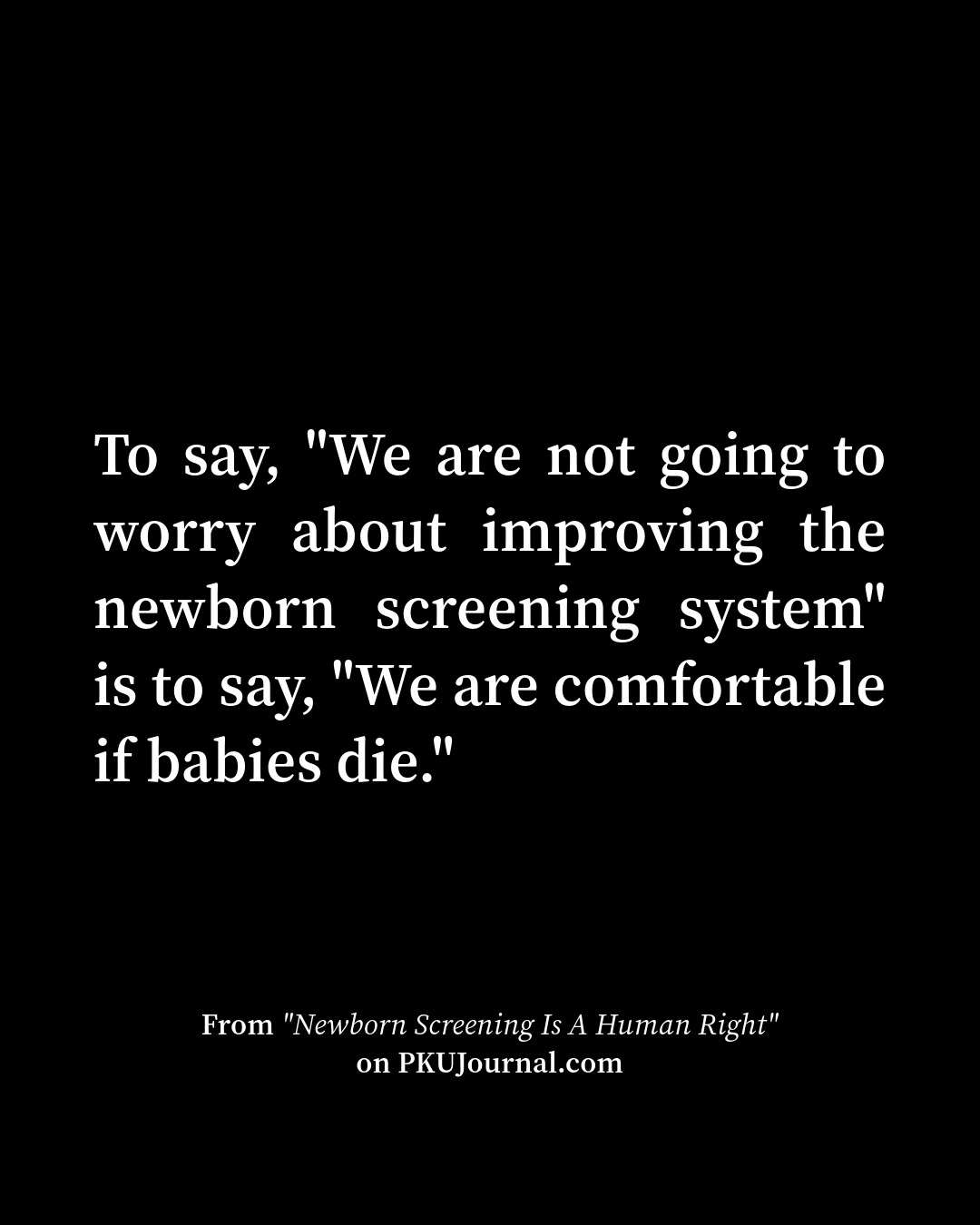
Over the years, I’ve had people reach out to me to share their newborn screening stories. Stories that didn’t have a positive ending.
The newborn screening story for someone with PKU has a happy ending, for the most part. We get our diagnosis, we’re placed on treatment, and most can live a happy, healthy life.
But for others, it’s a source of pain.
One mother reached out a few years ago after I shared a positive story about newborn screening. She told me that her daughter was born with Maple Syrup Urine Disease (MSUD), the results were delayed, the diagnosis came at 10 days, but it was too late.
Her daughter died.
Newborn screening was performed. And her daughter still died. Because cracks in the system delayed the results.
We need to do everything we can to improve the newborn screening system, not slowly dismantle it.
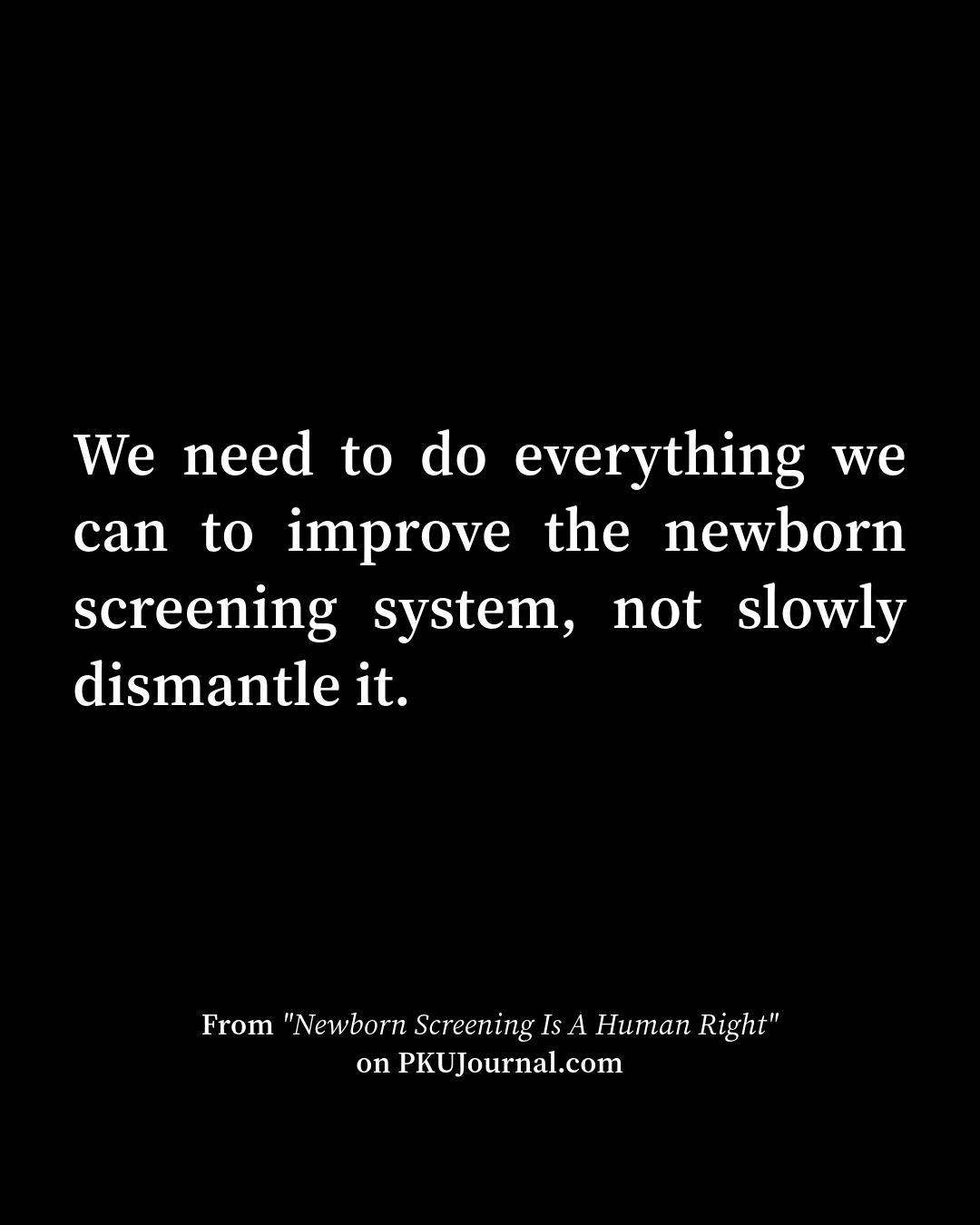


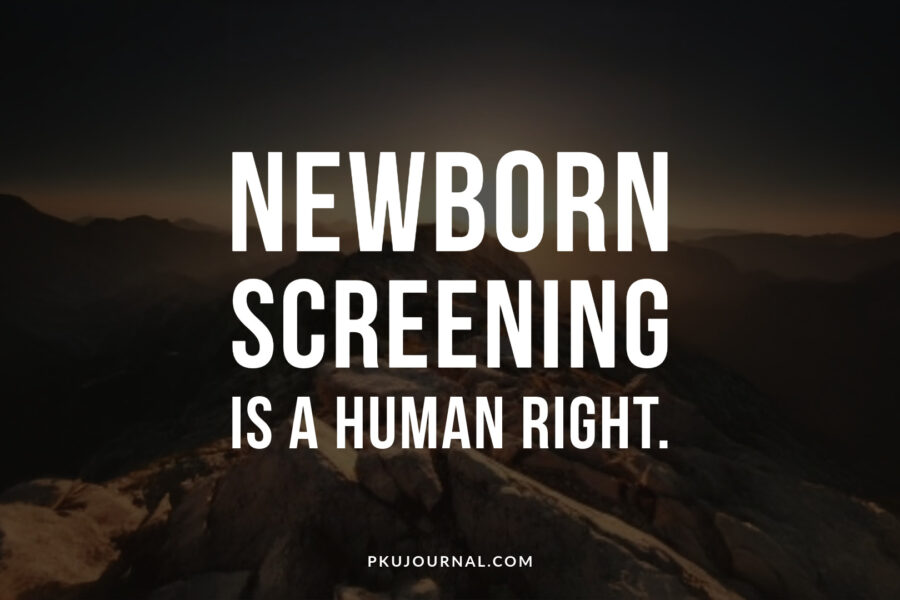


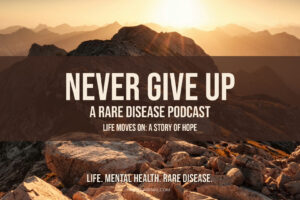





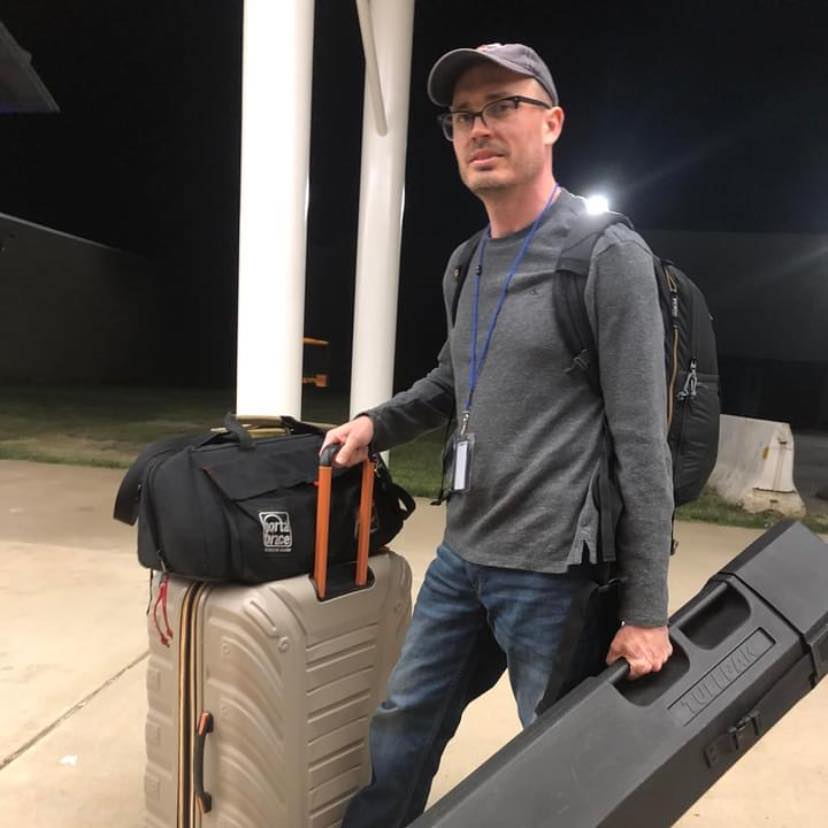
Leave a Reply